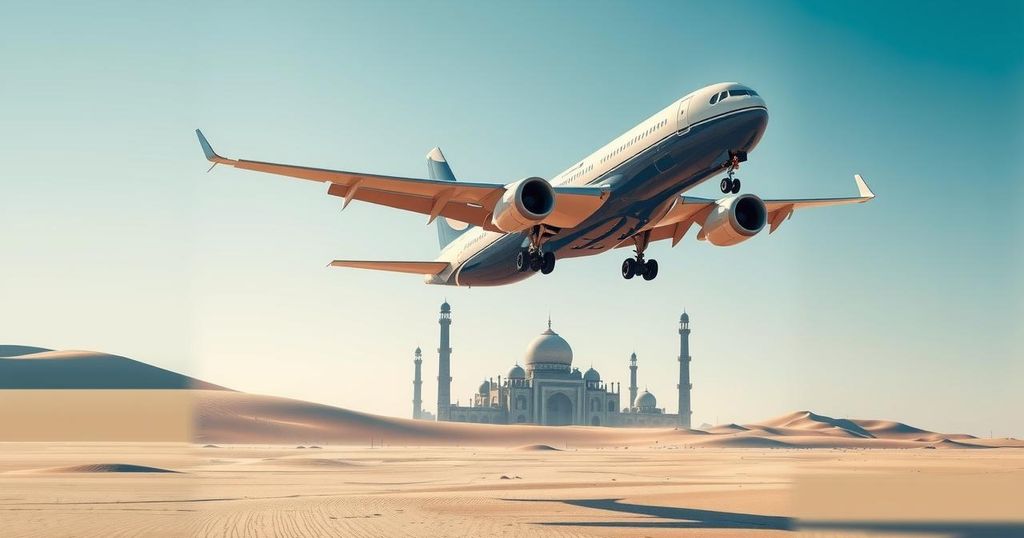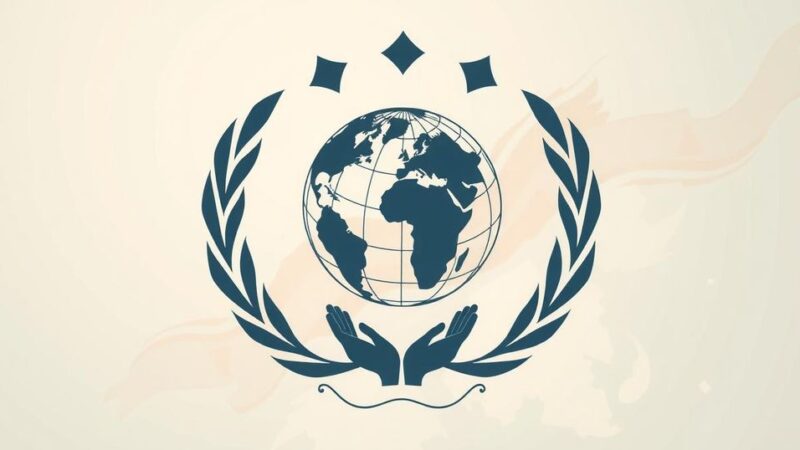Syria’s interim president, Ahmad al-Sharaa, made his inaugural trip abroad to Saudi Arabia, signifying a potential shift away from Iranian influence. This visit, accompanied by Foreign Minister Asaad al-Shaibani, indicates an effort to strengthen diplomatic relations with Saudi Arabia. The interim government faces numerous challenges, including mitigating security threats and rebuilding the country post-conflict, while striving for international reconciliation and lifting sanctions.
On Sunday, Syria’s interim president, Ahmad al-Sharaa, marked his first official international trip by arriving in Saudi Arabia, signifying a potential pivot away from Iran as Syria’s key regional ally. Accompanied by Foreign Minister Asaad al-Shaibani, the two traveled on a Saudi aircraft. Al-Sharaa is recognized globally under the alias Abu Mohammed al-Golani and emphasized the importance of Riyadh as his chosen destination.
Upon landing in Riyadh, al-Sharaa was greeted with a display of Syria’s new three-star flag alongside Saudi Arabia’s, underscoring a notable diplomatic gesture. Dressed formally, he was set to engage in discussions with Saudi Crown Prince Mohammed bin Salman, reflecting an evolving relationship between Syria and Saudi Arabia.
Historically, Saudi Arabia invested heavily in opposing soon-to-be dictator Bashar Assad during the Arab Spring uprising in 2011. Support from Iran and Russia for Assad eventually led to a stalemate in the conflict, but recent developments related to al-Sharaa’s militia have begun to alter the regional dynamics.
The change in Syria’s leadership was influenced by al-Sharaa’s association with the Hayat Tahrir al-Sham (HTS), a group formerly linked to al-Qaida, which has distanced itself from that past. Al-Sharaa and HTS have been strategically enhancing their public image and keeping a distance from both Iran and Russia while addressing internal governance by including women in key roles and promoting inclusivity among diverse communities within Syria.
Efforts to restore diplomatic relations with Arab neighbors are evident, as Saudi Arabia aims to aid in lifting economic sanctions on Syria. Earlier visits, including one by Saudi Foreign Minister Prince Faisal bin Farhan to Damascus, indicate ongoing dialogue aimed at facilitating Damascus’ reintegration into the Arab fold, which has been ongoing since 2023.
Nonetheless, Syria’s interim government continues to grapple with security threats, such as the recent car bomb incident in Manbij, emphasizing the ongoing volatility and challenges that remain in building a stable and prosperous nation after years of conflict. The future of Syria hinges not only on foreign relations but also on addressing internal strife and the humanitarian needs of its citizens.
The visit of Syria’s interim president marks a significant moment in the shifting regional dynamics following the ongoing civil war, which began with the Arab Spring protests in 2011. Despite previous tensions, Syria now seeks to enhance its relationships with previously unsupportive Arab nations, particularly Saudi Arabia, which had previously backed insurgent factions against the Assad regime. The strategies employed by al-Sharaa highlight a strategic distancing from Iran and a rebranding aimed at gaining legitimacy on the international stage. The backdrop of this diplomatic overture includes the need for reconstruction and economic recovery in Syria, a complex undertaking necessitating the alleviation of international sanctions and regional cooperation. The international community’s perception of Syria is crucial in rebuilding the war-torn nation as millions of citizens continue to face hardships amidst ongoing conflicts.
In summary, Ahmad al-Sharaa’s first international trip to Saudi Arabia reflects a strategic shift in Syria’s approach to foreign relations, moving away from reliance on Iran and seeking to reintegrate into the Arab community. With ongoing threats from various militant groups within Syria, the interim government faces significant challenges as it endeavors to improve ties with regional powers while addressing humanitarian needs and the country’s reconstruction. The outcomes of these diplomatic engagements could play a critical role in shaping Syria’s future.
Original Source: www.voanews.com






